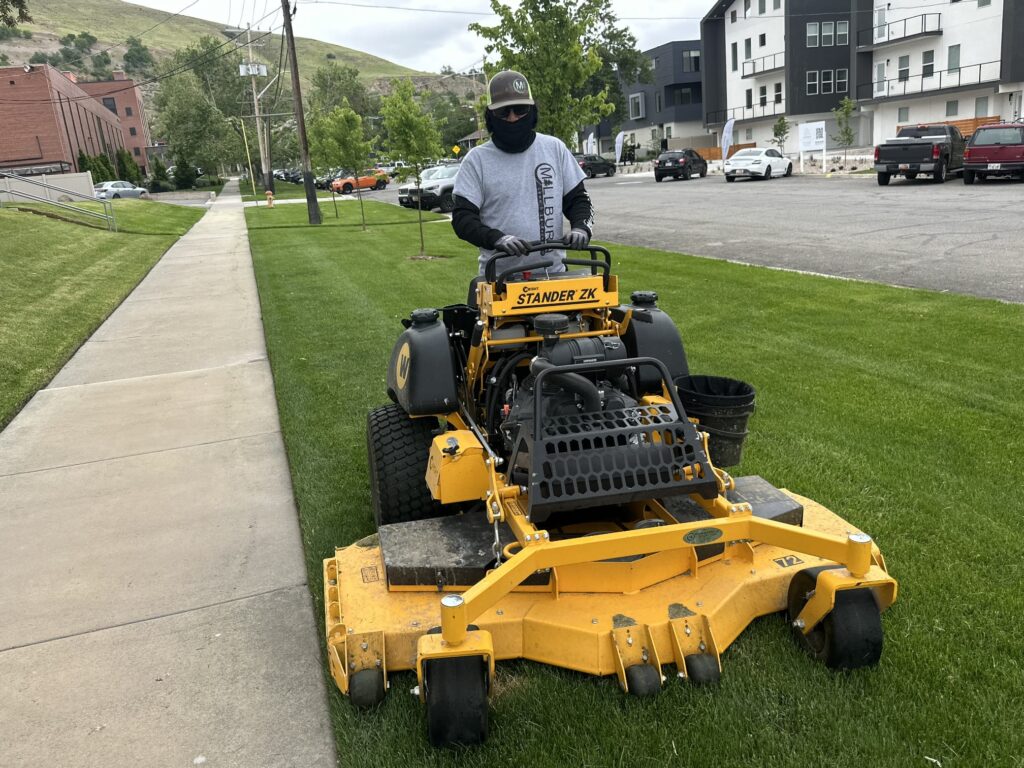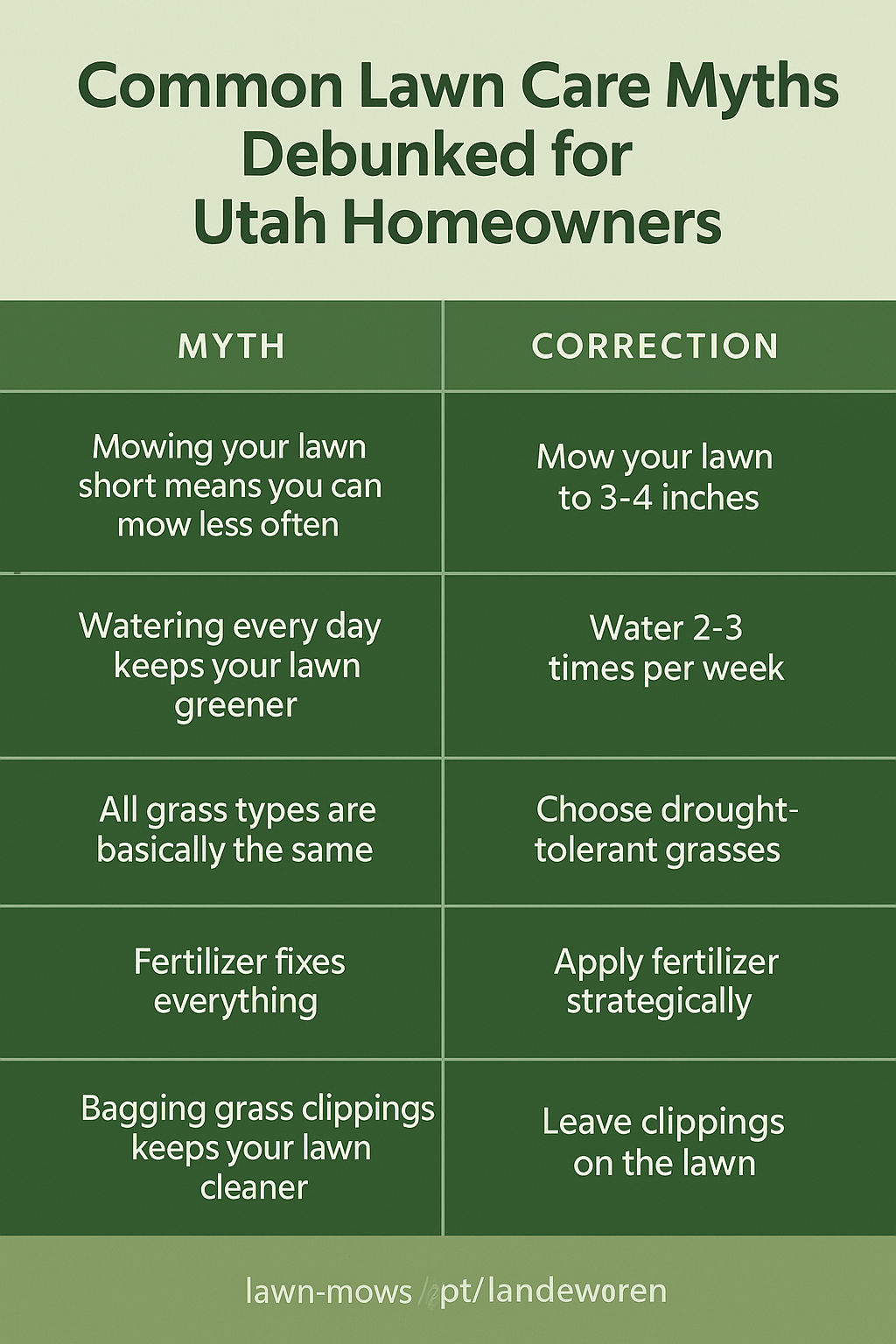Utah’s high-desert environment makes lawn care more complex than many realize. Yet many homeowners in Eagle Mountain unknowingly follow outdated or misguided advice that can actually damage their lawns. These myths may seem harmless, but over time they lead to weak grass, bare patches, and high water bills.
This post uncovers some of the most common lawn care myths Utah homeowners still believe, explains why they don’t work in our dry climate, and offers expert-backed alternatives to help your lawn thrive.
Myth #1: Mowing Your Lawn Short Means You Can Mow Less Often
This is one of the most widespread misconceptions. While mowing short might delay your next mow, it stresses your grass. In Eagle Mountain’s dry, high-altitude climate, this practice exposes soil to direct sun, causing faster evaporation and encouraging weed growth.
What to Do Instead:
Mow your lawn to a height of 3 to 4 inches. Taller grass provides natural shade for the soil, helping to retain moisture and crowd out weeds. Consistent, weekly mowing is far more effective and safer for lawn health.
Myth #2: Watering Every Day Keeps Your Lawn Greener
Utah’s dry air and sunshine might tempt homeowners to water daily, but this approach promotes shallow root systems and fungal growth. Grass becomes dependent on frequent watering and can’t survive dry spells.
What to Do Instead:
Water deeply 2–3 times per week, allowing moisture to reach 6–8 inches below the surface. Early morning watering is best to reduce evaporation.
Internal Link Opportunity:
Our Eagle Mountain lawn mowing services work hand-in-hand with proper watering schedules to protect root depth and minimize moisture loss.
Myth #3: All Grass Types Are Basically the Same
Not all grass species can thrive in Utah’s climate. Cool-season grasses like Kentucky bluegrass or tall fescue handle high-elevation heat and drought far better than ryegrass or fine fescue in full sun.
What to Do Instead:
Choose drought-tolerant grass types and reseed problem areas with blends adapted to Utah. Local seed suppliers or professional landscapers can recommend the right variety.
Myth #4: Fertilizer Fixes Everything
Fertilizer can be helpful—but it’s not a cure-all. In fact, applying too much nitrogen in the summer can burn your lawn, especially in hot, dry areas like Eagle Mountain.
What to Do Instead:
Apply fertilizer strategically in spring and fall. Look for slow-release or iron-rich formulas that boost color without forcing unnecessary top growth. Combine this with proper mowing and watering for real results.
Myth #5: Bagging Grass Clippings Keeps Your Lawn Cleaner
While bagging looks tidy, it also removes valuable nutrients. In a climate where grass struggles to thrive, you’re better off keeping those clippings on the lawn.
What to Do Instead:
Use grasscycling—a mulching mower returns finely cut clippings to the soil, which reduces the need for fertilizer and boosts moisture retention. It’s easy, natural, and ideal for Utah conditions.
Frequently Asked Questions
Q: Is it really bad to mow short in Utah?
A: Yes. Mowing short removes the grass’s natural shade protection, dries out the soil, and allows weeds to take over. Taller grass is healthier in Utah’s dry climate.
Q: Should I water more in the summer?
A: Watering more frequently isn’t the answer. Instead, water deeply a few times a week to train your grass to develop deeper, more drought-resistant roots.
Q: Can grasscycling cause thatch buildup?
A: No. Grasscycling with sharp mower blades produces fine clippings that break down quickly and nourish your lawn.
Q: How do I know what type of grass I have?
A: Your local lawn care provider can identify your grass species and recommend the best care strategy. Different grasses require different mowing and watering methods.

Want a Lawn That Actually Thrives in Eagle Mountain?
At Saratoga Mowing, we help homeowners avoid common mistakes with climate-specific mowing, watering, and care schedules. If you’re tired of following bad advice and getting poor results, we can help.
Click here to schedule your expert lawn care service in Eagle Mountain
Let’s make your lawn thrive—with proven techniques, not myths.


